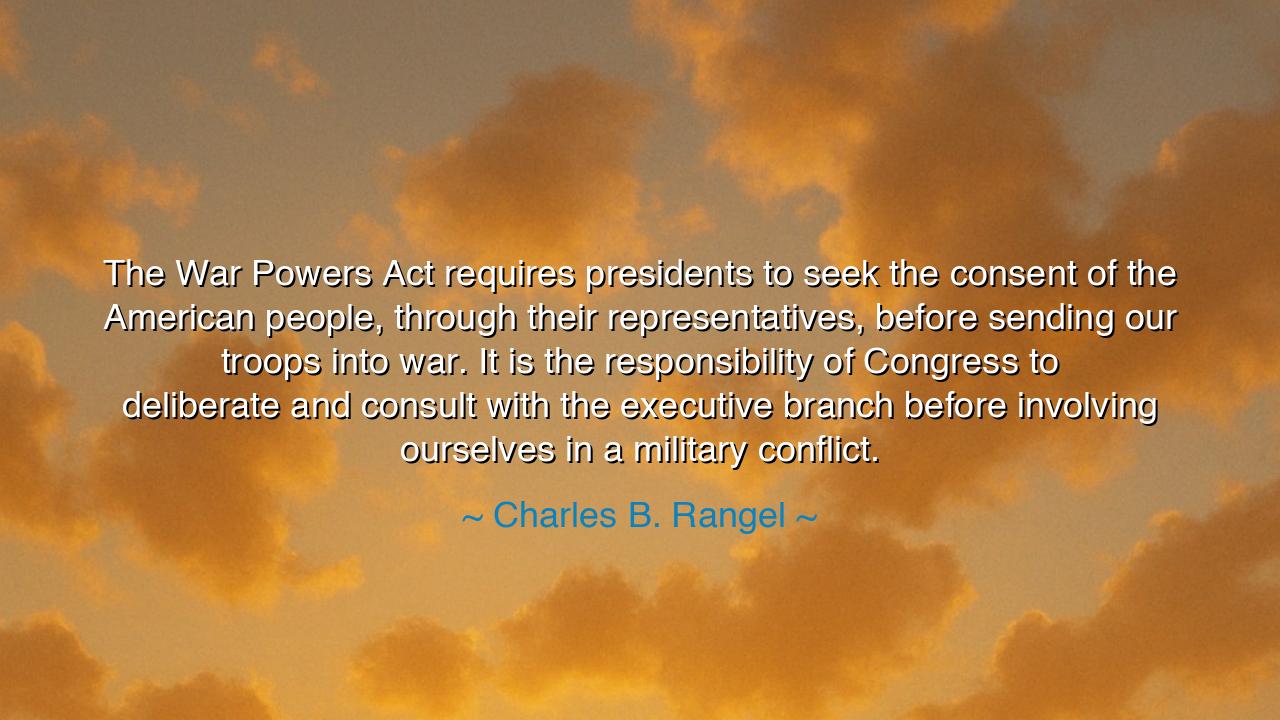
The War Powers Act requires presidents to seek the consent of
The War Powers Act requires presidents to seek the consent of the American people, through their representatives, before sending our troops into war. It is the responsibility of Congress to deliberate and consult with the executive branch before involving ourselves in a military conflict.






The American statesman Charles B. Rangel, himself a veteran of battle, spoke with the voice of both soldier and lawgiver when he declared: “The War Powers Act requires presidents to seek the consent of the American people, through their representatives, before sending our troops into war. It is the responsibility of Congress to deliberate and consult with the executive branch before involving ourselves in a military conflict.” In these words shines not only the letter of law, but the wisdom of restraint, born of the knowledge that the sword, once drawn, cuts both the innocent and the guilty, both the enemy abroad and the family at home.
The War Powers Act, forged in the wake of Vietnam, was not written lightly, but from wounds carved deep into the nation’s soul. Too often had presidents, moved by urgency or ambition, sent forth soldiers without the voice of the people being heard. Too often had lives been sacrificed before the people’s representatives had spoken. The Act stood, therefore, as a reminder that in a republic, the power to decide upon war—the gravest of all powers—cannot be left to one man alone. It must be shared, weighed, and judged in the light of collective wisdom.
Rangel, who knew firsthand the cost of conflict, warned against haste. For he had fought in Korea, seen comrades fall, and carried the memory of their sacrifice into the halls of Congress. When he spoke of the duty of Congress to deliberate and consult, it was not as a theorist but as a witness. He knew that behind every military decision are the lives of sons and daughters, mothers and fathers. To send them forth without full consent was not only reckless—it was unjust.
History bears witness to the dangers of ignoring such wisdom. In the Vietnam War, presidents escalated the conflict step by step, often without full congressional approval. The Gulf of Tonkin Resolution was stretched far beyond its intent, and tens of thousands of young Americans died in jungles far from home. It was this bitter lesson that gave rise to the War Powers Act of 1973, seeking to ensure that no president could again commit the nation to war without the people’s voice. Thus Rangel’s words stand in the tradition of those who learned through fire and loss that unchecked power breeds tragedy.
Yet his teaching is not only about governments—it is about all human life. Just as Congress must weigh carefully before entering war, so must each of us deliberate before entering conflict in our own lives. Rash words, rash actions, rash decisions—these are the private wars we wage without counsel, and they too leave scars upon others. To seek consent, to deliberate with wisdom, to consult with those we trust—these are practices that prevent unnecessary battles in the household, the workplace, and the community.
The lesson is clear: do not let passion or pride drive you into conflict without reflection. When great decisions lie before you, pause, consult, deliberate, and honor the voices of those who will be affected. For true leadership is not the lonely command of one will, but the weaving together of many voices into one common purpose. The wise ruler, like the wise citizen, does not fear consultation, for it is in counsel that the seeds of justice are sown.
Therefore, let this wisdom be passed down: honor the War Powers Act not only as a law of a nation, but as a parable for life. Share power rather than hoard it. Seek counsel rather than act in isolation. Remember that every choice to wage war, whether of nations or of individuals, must first reckon with those whose lives will bear the burden. For in this way, we honor both freedom and responsibility, and ensure that the gravest decisions are made not in haste, but in the light of justice and truth.






MDNguyen tran minh dang
This quote really makes me reflect on how military decisions are made in a democratic society. Shouldn't the American people, through their representatives, have a say in such serious matters? But in the face of fast-moving global threats, is this process too slow? Are we striking the right balance between ensuring accountability and maintaining the ability to respond quickly to threats, or is the system in need of reform?
QNNguyen Quynh Nhu
I find it interesting that Rangel emphasizes the War Powers Act as a necessary safeguard for involving the U.S. in military conflicts. But how realistic is it to expect Congress to effectively consult and deliberate on military matters when there’s often urgency in modern warfare? Do the complexities of today’s global threats make this process more difficult, or do we risk sacrificing accountability for the sake of national security?
LCDoan Linh Chi
Rangel’s statement highlights the critical role of Congress in approving military actions, yet I wonder how effective this is in practice. The need for quick action in times of war sometimes conflicts with the idea of seeking consent from the people’s representatives. How can we balance the need for decisive military action with the responsibility to ensure proper deliberation and democratic oversight? Does this process hinder or help the nation’s response to threats?
MNMinh Nguyen
Charles B. Rangel’s quote brings up an important point about the balance of power between the executive branch and Congress when it comes to military decisions. Does the War Powers Act truly provide enough checks on presidential power, or does it just create a bureaucratic delay when swift action is needed? How often do we see this act enforced, and what impact does it have on the decision-making process? Should Congress have more power in these matters?